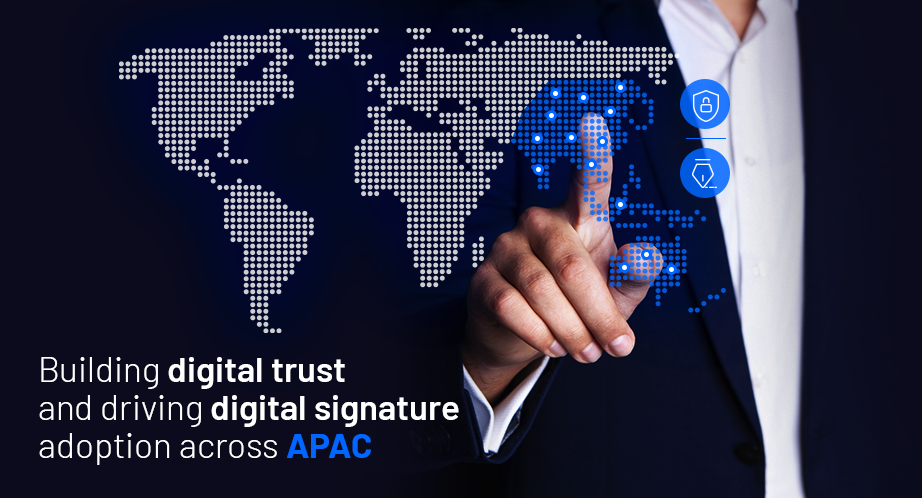The Asia-Pacific (APAC) region is in the midst of a sweeping digital transformation. With rising internet penetration, booming e-commerce, and accelerating smart-nation and ambitious remote working initiatives, the demand for secure, efficient and legally binding digital transactions has never been greater.
At the heart of this shift are two critical enablers: digital trust, anchored in strong cryptography and identity verification, and digital signatures, which protect document integrity and deliver legal assurance.
This blog combines insights into APAC’s evolving digital trust regulatory landscape with a look at adoption trends and how Ascertia supports organisations across APAC to navigate these changes and build secure digital workflows.

Why strong digital signatures and trust matter in APAC
Digital signatures go beyond basic e-signatures (like typed names or scanned signatures). Powered by cryptographic certificates and tamper-evident technology, they offer non-repudiation and the highest level of legal standing, critical in APAC markets that are modernising at breakneck speed.
They enable organisations to:
- Eliminate manual delays: No more printing, signing, scanning. Digital signing accelerates approvals.
- Boost security: PKI and digital certificates ensure authenticity; audit trails detect
- Drive cost savings: Paperless digital workflows reduce printing, courier and storage overheads.
- Enhance user experience: Fast, friction-free signing, on any device, from any location.
- Support global commerce: Fully recognised across borders, enabling seamless international workflows.
- Ensure legal compliance: Governments across APAC increasingly mandate and regulate digital signing.
APAC’s regulatory frameworks: Where we stand today
Each APAC market defines digital signature types and legal thresholds differently. Below is a summary of key national regulations and updates as of mid-2025:
India
Under the IT Act 2000, two signature types are recognised:
- “Electronic Signature” (ES): Requires public key infrastructure (PKI) and a digital certificate issued by a licensed Certifying Authority (CA)
- “Digital Signature” (DS): Uses a digital signature certificate issued by a licensed authority but does not require PKI
Both are legally valid, but ES offers higher trust. Certifying Authorities must follow strict issuance and verification protocols.
Singapore
The Electronic Transactions Act (ETA) 2010 considers any signature method that is reliable and attributable to the signatory as legally valid. While even scanned signatures qualify, PKI-backed digital signatures carry greater evidentiary weight, which is particularly critical for banks, government, and regulated sectors.
Malaysia
The Digital Signature Act 1997 recognises both certificate-based digital signatures and biometric signatures (e.g., fingerprint). While PKI is recommended, the law emphasises the overall reliability of the signature method rather than mandating specific technologies.
Australia
Under the Electronic Transaction Act (ETA) 1999, methods that reliably identify signatories and show intent, whether scanned or certificate-based, are permitted. Stricter digital signature standards govern specific sectors like healthcare.
China
The Electronic Signature Law (2014) defines a three-tier system for electronic signatures:
- Low: Scanned signature or basic authentication methods
- Medium: Digital signatures issued by a licensed Certification Service Provider (CSP)
- High: PKI-based digital signatures with a certificate issued by a trusted CSP
High-level digital signatures are now widely accepted across official Chinese government transactions and administrative processes.
Vietnam
The Law on Electronic Transactions No. 20/2023/QH15 defines:
- Level 1 e-signature: Basic methods such as handwritten signatures or one-time PINs (OTPs).
- Level 2 e-signature: Uses stronger authentication methods such as digital certificates or biometrics.
- Level 3 e-signature: Uses a qualified digital certificate issued by a licensed CA in accordance with Vietnamese regulations.
This structured approach aligns legal validity with security levels.
Japan
The Electronic Signature and Certification Business Act (ESCBA) 2000 recognises:
- Designated digital signature (Shikibetsu Shin’yo Gogyosho): Requires a digital certificate issued by a licensed CA designated by the Japanese government.
- Ordinary digital signature (Ippan Gogyosho): Does not require a certificate issued by a government-designated CA
Adoption trends and the roadblocks
In a 2024 AscertiaOn episode, Netrust’s Larry Lee highlighted that:
- COVID-19 accelerated digital adoption, especially for remote transactions.
- Key barriers included legacy paper workflows, trust issues, and limited knowledge of compliance landscapes.
- But the tide is turning: Digital signature penetration is rising in banking, government services (tax, business registration), and e-commerce. Technologies like blockchain and stronger cryptographic methods are reinforcing trust.
Major challenges to tackle
Despite substantial regulatory progress and growing adoption, many organisations across APAC still face a number of critical obstacles when implementing digital signatures. These challenges are often less about technology and more about change management, legacy infrastructure and regulatory complexity..
Legacy mindset
Many organisations, especially those in highly-regulated or traditional industries, still operate with a “paper-first” mentality. Even firms that have embraced digital systems in other areas hesitate when it comes to digitising legal or contractual documents.
Lack of standards awareness
A common misconception is that all e-signatures are created equal. In reality, there is a spectrum of trust levels. Many businesses are unfamiliar with:
- The varying trust and security levels of digital signatures
- The role of CAs and Trust Service Providers (TSPs)
- International and local compliance standards
This confusion often results in weak implementations that fail to meet legal or industry-specific compliance standards, particularly in cross-border transactions.
Security concerns
While digital signatures are designed to enhance security, there’s often hesitation around cryptographic technologies. Common questions from legal, compliance and IT teams include:
- Is our CA issuing our certificate secure and accredited?
- Can signatures get forged or intercepted?
- Are remote and mobile signing methods vulnerable to attack?
These concerns stem from limited awareness of cryptographic protocols, digital certificate chains, and the role of hardware security modules (HSMs)
Integration and workflow complexity
For real efficiency gains, signatures must integrate smoothly with existing systems including ERP , document management platforms, CRMs, procurement portals, HR platforms, and more. Many of the off-the-shelf solutions fail to meet enterprise-level integration needs.
Jurisdictional fragmentation
Even within a single region like APAC, the legal recognition of digital signatures can vary widely. For example:
- A certificate-based signature may have full legal standing in Singapore, but only partial evidentiary weight in Japan unless issued by a designated CA.
- Vietnam’s three-tier trust model differs significantly from Australia’s more flexible model.
- Some jurisdictions require signatures to be issued by locally licensed providers, while other accept cross-border certificates.
This legal fragmentation makes it difficult for multinational companies to adopt a “one-size-fits-all" solution.
Opportunities ahead
The potential of digital signature adoption in APAC is huge. Key benefits include
- Automation: Paperless, scalable digital workflows
- Cost-efficiency: Reduction in printing, couriering and storage costs
- Security: Tamper-evident signatures built on audited PKI and blockchain
- Citizen-centric services: Enables Smart Nation goals, e-government platforms and remote working
- Innovation: Integration with AI, IoT, and remote and cloud-based signing platforms.
“Once organisations experience convenience and security, they rarely revert to paper.” - Larry Lee, Netrust
Market-wide trends in 2025 and emerging technology
- Unified tiered frameworks: Vietnam’s Level 1-3 model is being examined by other governments.
- Cross-border alignment: Regional and international bodies including ASEAN, APAC, and UNCITRAL) are increasingly aligning on common e-signature standards to simplify transactions.
- Remote and cloud signing: CSC-compliant remote PKI-based solutions have become standard among leading vendors. Our partnership with TrustAsia highlights this shify.
- Blockchain and AI integration: These technologies are being adopted to ensure tamper-evident, self-verifying digital signatures.
- Post-quantum readiness: Early development of quantum-resistant signing schemes are essential for long-term security.
How Ascertia supports APAC’s digital transformation journey
With deep local expertise and global-standard solutions, we help organisations across APAC confidently adopt digital signatures through:
- Regulatory expertise
Our team actively monitors legislative developments including IT Acts, ETA, ESCBA, and more to ensure your workflows meet evolving national and regional legal compliance standards. - Standards-enabled tools
SigningHub supports Cloud Signature Consortium (CSC) remote PKI signing. We integrate with trusted CAs like TrustAsia and Netrust. - Strong security foundations
Our solutions feature tamper-evident audit trails, robust PKI, certificate validation, and timestamping to ensure your digital trust infrastructure is rock solid. - Seamless integration
SigningHub, ADSS Signing Server, ADSS Certification and Validation Authorities, and SDKs integrate with ERP, CRM, and document management systems, making signing frictionless. - Scalable across APAC
Whether serving an SME use in Vietnam, enabling government systems in Japan, or supporting cryptographic compliance in India’s financial sector, our solutions scale to match your needs.
Real-world success stories
Netrust (Singapore)
Singapore’s only commercial CA, Netrust, partnered with Ascertia to embed advanced workflows and PKI-backed digital signing into Smart Nation initiatives, balancing local policy needs and global standards.
TrustAsia (China)
By integrating with Ascertia via CSC standards, TrustAsia enhanced its signature capabilities while ensuring compliance with China’s high-trust digital signature tiers.
Accelerating your digital evolution
To fully unlock APAC opportunities:
- Map your workflow requirements across markets to match legally recognised signature types.
- Choose the appropriate trust level, which can be simple or PKI-based, depending on transaction value, legal need and risk.
- Select a technology partner with local regulation expertise and global standards compliance, like Ascertia.
- Run pilot deployments in key sectors like finance or government to build adoption confidence.
- Scale securely, with auditability, certificate management, timestamping, and high-availability infrastructure.
The future of digital trust in APAC
The Asia-Pacific region is rapidly evolving into a powerhouse for digital transformation, and secure digital signatures are central to that momentum. As we look into the future, several key trends will shape the landscape:
- Hybrid trust models will emerge, combining the proven security of PKI with the transparency and immutability of blockchain anchoring.
- Government standardisation of digital signature tiers, like Vietnam’s structured framework, is likely to expand across the region enabling more consistent legal recognition across borders.
- Cross-border interoperability will accelerate through regional cooperation and technical alignment, helping businesses transact seamlessly from Singapore to Sydney and Seoul.
- Post-quantum cryptography will increasingly play a role in long-term trust assurance, ensuring that today’s signatures remain valid and secure in tomorrow’s threat landscape.
In short, the region is entering a new era of digital trust.
The foundations are already in place. Nations like India, Singapore, China, and Vietnam have created forward-looking regulatory environments.Smart Nation projects and pandemic-driven digisation have accelerated awareness and readiness. However, real success depends on more than just policy. It demands secure, standards-compliant, user-friendly technologies that integrate seamlessly into everyday business processes.
That’s exactly where Ascertia makes a difference.
Whether you’re navigating local legal complexities or building scalable, multi-jurisdictional signing workflows, Ascertia offers the tools and expertise you need to succeed.
Our SigningHub platform, ADSS product suite, and CSC-compliant remote signing capabilities meet the highest global standards, while being tailored to APAC’s diverse regulatory environment.
Ready to take the next step?
Let’s build digital trust together. Contact the Ascertia team to discuss your unique requirements.
Digital transformation is no longer optional, and with the right partner, you can sign, scale, and succeed across APAC and beyond.


